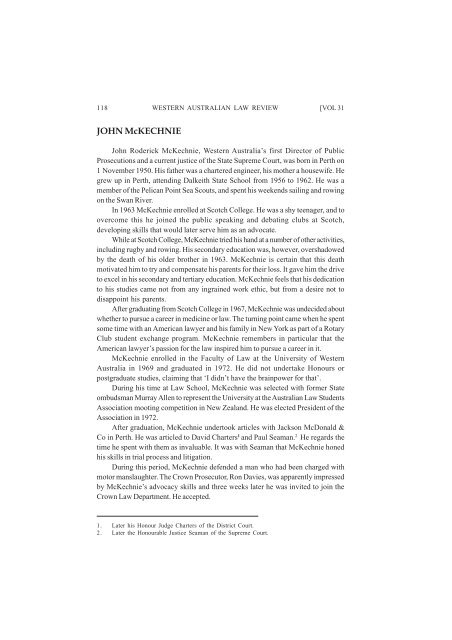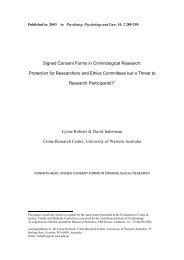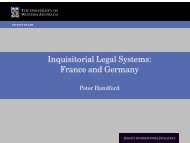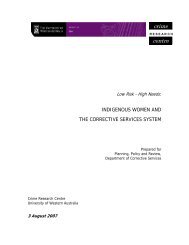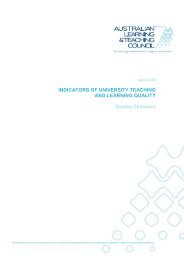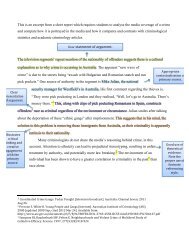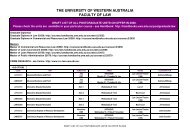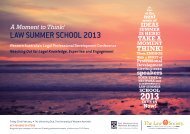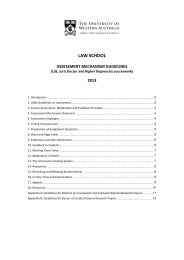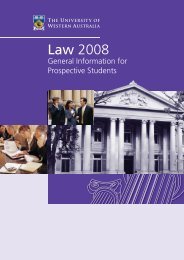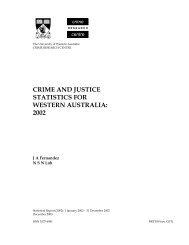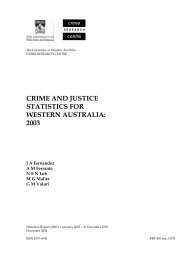JOHN McKECHNIE - UWA Law Review - The University of Western ...
JOHN McKECHNIE - UWA Law Review - The University of Western ...
JOHN McKECHNIE - UWA Law Review - The University of Western ...
You also want an ePaper? Increase the reach of your titles
YUMPU automatically turns print PDFs into web optimized ePapers that Google loves.
118 WESTERN AUSTRALIAN LAW REVIEW [VOL 31<br />
<strong>JOHN</strong> <strong>McKECHNIE</strong><br />
John Roderick McKechnie, <strong>Western</strong> Australia’s first Director <strong>of</strong> Public<br />
Prosecutions and a current justice <strong>of</strong> the State Supreme Court, was born in Perth on<br />
1 November 1950. His father was a chartered engineer, his mother a housewife. He<br />
grew up in Perth, attending Dalkeith State School from 1956 to 1962. He was a<br />
member <strong>of</strong> the Pelican Point Sea Scouts, and spent his weekends sailing and rowing<br />
on the Swan River.<br />
In 1963 McKechnie enrolled at Scotch College. He was a shy teenager, and to<br />
overcome this he joined the public speaking and debating clubs at Scotch,<br />
developing skills that would later serve him as an advocate.<br />
While at Scotch College, McKechnie tried his hand at a number <strong>of</strong> other activities,<br />
including rugby and rowing. His secondary education was, however, overshadowed<br />
by the death <strong>of</strong> his older brother in 1963. McKechnie is certain that this death<br />
motivated him to try and compensate his parents for their loss. It gave him the drive<br />
to excel in his secondary and tertiary education. McKechnie feels that his dedication<br />
to his studies came not from any ingrained work ethic, but from a desire not to<br />
disappoint his parents.<br />
After graduating from Scotch College in 1967, McKechnie was undecided about<br />
whether to pursue a career in medicine or law. <strong>The</strong> turning point came when he spent<br />
some time with an American lawyer and his family in New York as part <strong>of</strong> a Rotary<br />
Club student exchange program. McKechnie remembers in particular that the<br />
American lawyer’s passion for the law inspired him to pursue a career in it.<br />
McKechnie enrolled in the Faculty <strong>of</strong> <strong>Law</strong> at the <strong>University</strong> <strong>of</strong> <strong>Western</strong><br />
Australia in 1969 and graduated in 1972. He did not undertake Honours or<br />
postgraduate studies, claiming that ‘I didn’t have the brainpower for that’.<br />
During his time at <strong>Law</strong> School, McKechnie was selected with former State<br />
ombudsman Murray Allen to represent the <strong>University</strong> at the Australian <strong>Law</strong> Students<br />
Association mooting competition in New Zealand. He was elected President <strong>of</strong> the<br />
Association in 1972.<br />
After graduation, McKechnie undertook articles with Jackson McDonald &<br />
Co in Perth. He was articled to David Charters 1 and Paul Seaman. 2 He regards the<br />
time he spent with them as invaluable. It was with Seaman that McKechnie honed<br />
his skills in trial process and litigation.<br />
During this period, McKechnie defended a man who had been charged with<br />
motor manslaughter. <strong>The</strong> Crown Prosecutor, Ron Davies, was apparently impressed<br />
by McKechnie’s advocacy skills and three weeks later he was invited to join the<br />
Crown <strong>Law</strong> Department. He accepted.<br />
1. Later his Honour Judge Charters <strong>of</strong> the District Court.<br />
2. Later the Honourable Justice Seaman <strong>of</strong> the Supreme Court.
FEB 2003] THE JUDGES OF WESTERN AUSTRALIA 119<br />
McKechnie’s initial<br />
intention was to spend<br />
about five years with the<br />
Department before going to<br />
the bar. At some stage,<br />
however, he was seduced<br />
by the nature <strong>of</strong> the work<br />
and the quality <strong>of</strong> the<br />
people in the Department.<br />
He spent a great deal <strong>of</strong><br />
time assisting the then<br />
Solicitor-General, Kevin<br />
Parker QC. McKechnie<br />
practised in a wide range<br />
<strong>of</strong> Crown <strong>Law</strong> work,<br />
including constitutional<br />
law, administrative law,<br />
personal injuries litigation<br />
and criminal matters. He<br />
appeared regularly in the<br />
Court <strong>of</strong> Criminal Appeal<br />
and the High Court.<br />
Towards the end <strong>of</strong> 1989, McKechnie took silk. He was 39 years old. A few<br />
months later he was appointed Crown Prosecutor. For the first time in his career, he<br />
was working solely in the criminal law field.<br />
In December 1991 McKechnie was appointed <strong>Western</strong> Australia’s first Director<br />
<strong>of</strong> Public Prosecutions. He describes this role as a difficult but rewarding one. Of<br />
particular importance to McKechnie was maintaining both independence and<br />
accountability to the public. 3 He feels that anyone undertaking the role must<br />
command respect, but not popularity.<br />
During his eight-year term as DPP, his Department processed on average around<br />
2 500 prosecutions a year. In 1992 it employed 20 counsel; by the end <strong>of</strong> his term in<br />
1999, it employed over 50 counsel. 4<br />
McKechnie’s contribution to the <strong>Western</strong> Australian legal system was formally<br />
recognised in 1999 when he was appointed a justice <strong>of</strong> the Supreme Court. He<br />
remembers feeling that it was an honour to be appointed to the Bench and, at the<br />
3. See J McKechnie ‘Directors <strong>of</strong> Public Prosecutions: Independent and Accountable’ (1996)<br />
26 <strong>UWA</strong>L Rev 268.<br />
4. Office <strong>of</strong> the Director <strong>of</strong> Public Prosecutions, <strong>Western</strong> Australia 2000-2001 (Perth, 2001)<br />
19.
120 WESTERN AUSTRALIAN LAW REVIEW [VOL 31<br />
same time, an enormous responsibility. His new role as Supreme Court judge meant<br />
that he now had to consider matters from a different perspective.<br />
McKechnie maintains a number <strong>of</strong> pursuits outside the courtroom. He has coordinated<br />
and taught the Forensic Advocacy course at the <strong>University</strong> <strong>of</strong> <strong>Western</strong><br />
Australia since 1987 and taught Criminal <strong>Law</strong> as a Visiting Fellow in 1985-1986. He is<br />
the Chair <strong>of</strong> the Articled Clerks Training Program and a Council Member <strong>of</strong> the<br />
Presbyterian Ladies College.<br />
McKechnie feels that it is ‘desperately important’ for lawyers to maintain a<br />
balance in their lives. He has seen too many lawyers unnecessarily sacrificing their<br />
personal lives in the interests <strong>of</strong> their career. McKechnie is critical <strong>of</strong> the attitude <strong>of</strong><br />
those lawyers for whom family life, sport and other recreational activities are<br />
secondary to the law. He firmly believes that, apart from anything else, lawyers must<br />
have a broad range <strong>of</strong> experiences outside the law to draw upon if they wish to excel<br />
in that pr<strong>of</strong>ession.<br />
McKechnie spends as much time as he can with his wife, Beth, and their five<br />
children. He particularly enjoys sailing his catamaran with them.<br />
McKechnie claims that he is a ‘pretty unremarkable person’. However, his<br />
accomplishments as <strong>Western</strong> Australia’s first Director <strong>of</strong> Public Prosecutions,<br />
Queen’s Counsel and justice <strong>of</strong> the Supreme Court <strong>of</strong> <strong>Western</strong> Australia suggest<br />
that he is no ordinary lawyer.<br />
[G.M.]


